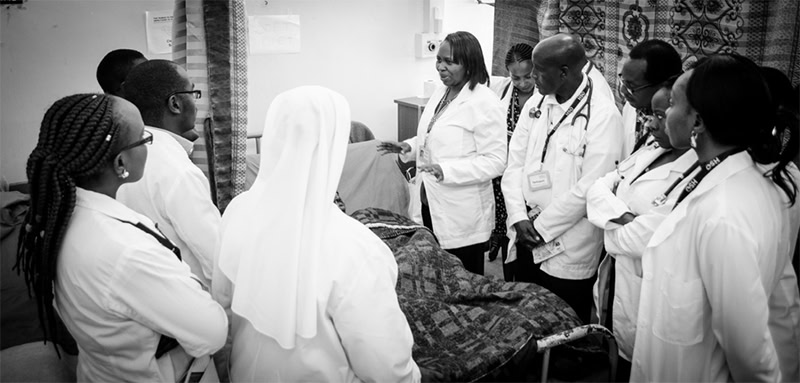
We have a very BIG DREAM…We envision an African continent filled with enduring and improving health systems where everyone has access to quality, compassionate healthcare.
We believe an expanded network of Mission Teaching Hospitals is a critical component to achieving this dream.
Why a Teaching Hospital Network?
Africa suffers from 24% of the world’s disease burden but has only 3% of the health workers. The continent is projected to have a deficit of 4.3 million health workers by 2035. A mother is 50 times as likely to die after a C-section in Africa as in the West. Christian mission hospitals are uniquely positioned to address these challenges as trusted members of their communities that have provided quality compassionate care for decades. They have established training centers with deep roots and existing infrastructure. African Mission Healthcare’s Mission Hospital Teaching Network (MHTN), part of the Gerson L’Chaim (To Life) Initiative, strengthens existing and emerging training centers of excellence. African Mission Healthcare combines medical and programmatic expertise with needed financial and management support to enhance institutional sustainability and expand medical education programs across Africa. MHTN partners will learn from each other and assist surrounding health facilities. They will train the next generation of compassionate and competent healthcare professionals who will spread out across the continent to care for and train others.
You can help. Building an effective teaching hospital network will require time and resources. The necessary investments will be tailored for each hospital and individual support like yours will make a significant difference.
The Mission Hospital Teaching Network:
- Mission hospitals already provide a superior level of education due to functional systems and dedicated teachers. Several are leading centers of excellence in their regions. But an expanded capacity for high-quality training and mentoring is desperately needed.
- Expanding the network will require a consistent and steady level of financial and management support to become premier centers of clinical and training excellence.
- A broad range of investments will be needed to reach their potential, such as: Water, power, internet, roads, housing, security, clinical space, training rooms, equipment, and external training of national staff and faculty.
- It’s an incredibly worthwhile investment; many highly trained workers will be added and hospitals and health professionals will work together to expand critically-needed skills and services such family medicine, preventive care, neonatal intensive care, pediatric surgery, plastic surgery, and cardio-thoracic expertise.